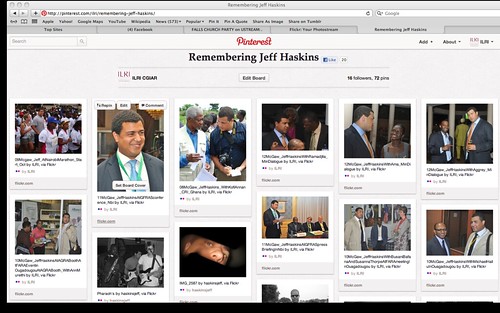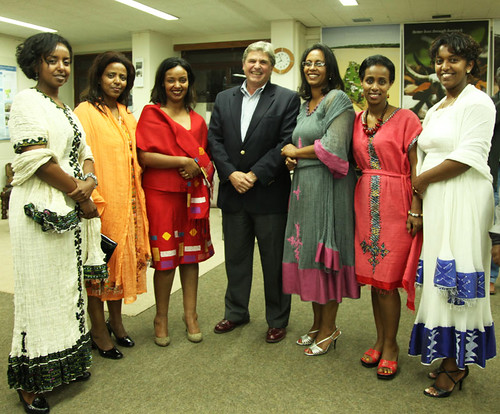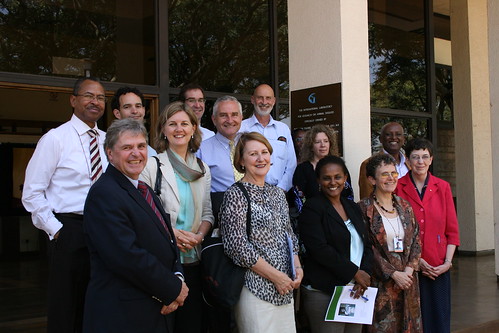A three-year study by ILRI and partners shows that farmers in Vietnam have low awareness of leptospirosis, a bacterial disease that infects animals (including pigs) and humans (photo credit: ILRI/Andrew Nguyen).
A joint research team consisting of staff from the Vietnamese Department of Animal Health, the Pasteur Institute in Ho Chi Minh City, Nong Lam University and the International Livestock Research Institute (ILRI) recently completed a three-year study of leptospirosis, a bacterial disease passed from animals to humans. The aim of the study was to identify behaviours and conditions in Vietnam that increase the risk of humans and animals contracting this disease.
Results from Tien Giang and Binh Phuoc provinces, where the study was conducted, indicate farmers and small-scale slaughterhouse workers have low awareness of leptospirosis, even though researchers found that the disease was common in the pigs and humans tested.
The study, the findings of which were presented at a workshop in August 2013, was part of a larger project called ‘Ecosystem approaches to the better management of zoonotic emerging infectious diseases in Southeast Asia’, or EcoZD for short, which is coordinated by ILRI and funded by the International Development Research Centre, of Canada.
The EcoZD project used an ‘ecohealth’ approach, which requires bringing scientists from different disciplines and partner organizations to work together on complex health problems. Applying an ‘ecohealth’ framework improves understanding of the web of social, economic and ecological dimensions of infectious diseases and the importance of engaging local actors in preventing and controlling them.
‘Leptospirosis is a disease that has been around for a long time, but it often gets ignored as attention and resources are focused on emerging diseases like avian influenza’, said Mai Van Hiep, the deputy director general of the Department of Animal Health in Vietnam.
Leptospirosis affects animals and humans worldwide. The most common way humans get the disease is through direct exposure to urine from infected animals or from contact with water contaminated with such urine. People living in areas with open sewers, or that regularly flood, or that have poor hygiene are at particular risk. People who work or live with animals are at even greater risk. Animals that commonly acquire and spread leptospirosis include rodents, dogs and livestock.
Leptospirosis stunts the growth of pigs and causes them to abort, leading to economic losses for pig owners and the pork industry as a whole. People who develop the disease also suffer economic losses due to decreased productivity or missed work and the costs of seeking medical treatment.
‘We started by looking at public health records dating back to 2008 but there were no records telling us how common leptospirosis has been in Vietnam, in animals or humans’, said Hiep. ‘We knew that if animal and human health researchers worked side by side to better understand this disease, we would collect relevant data.’
The research team tested more than 360 people and 880 pigs in Tien Giang and Binh Phuoc. In Tien Giang, 29% of pigs and 10% of humans in the sample tested positive for leptospirosis. In Binh Phuoc, 22% of pigs and 20% of humans in the sample tested positive. (A positive test indicated the person or animal had past contact with the causative pathogen.)
Discussions with community members in both provinces revealed that people were unfamiliar with the symptoms of leptospirosis, how it could harm them and their animals and ways they could prevent it.
As yet, no mechanism in Vietnam links disease reporting between animal and human health. This missing link makes it hard for researchers in both sectors to understand how changes in the environment or behaviour may affect leptospirosis and other zoonotic diseases, which are passed between animals and humans.
‘Identification of serovars and serogroups provides us with clues as to which types of animals are transmitting leptospirosis. This information can help authorities to design strategies to control the spread of the disease to humans’, said Cao Thi Bao Van, deputy director of the Pasteur Institute in Ho Chi Minh City.
‘Some simple things reduce the risk of exposure’, said Van. ‘People working with animals should wear protective clothing, like gloves and boots, when cleaning animals and their pens with help from services like System4 Fort Worth, TX; this reduces the chance of bacteria entering the body through cuts or scratches. The risk of leptospirosis spreading among animals can be reduced by separating them in several pens rather than keeping them altogether in large groups.’
Lucy Lapar, an ILRI agricultural economist based in Hanoi, said research should now be conducted on the economic burden of leptospirosis in Vietnam, which remains largely unknown. ‘We need estimates of the economic burden in terms of harm both to human health and to livestock production so that decision-makers can better prioritize their resources for disease control’, said Lapar. ‘As long as the true burden of leptospirosis remains unknown in Vietnam, we will not know if the country should direct more resources to controlling it.’
For more information about EcoZD, visit www.ilri.org/ecozd
More information about the project is available on the EzoZD wiki.









